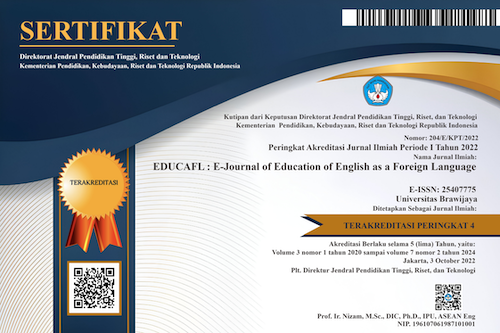The Importance of Instrumental Motivation among Students in Teaching English as Foreign Language (TEFL) Process
DOI:
https://doi.org/10.21776/ub.educafl.2022.005.01.01Keywords:
instrumental motivation, TEFL, learning EnglishAbstract
The aim of this research was to identify the category of students’ instrumental motivation and to describe the importance of instrumental motivation in the English learning process of English as Foreign Language (EFL) students. A quantitative descriptive method was used in this research to analyze the data. The subject of this research was 28 EFL students from the fourth semester students of English Education Study Program at STKIP-PGRI Lubuklinggau. The researchers used questionnaire and interview as instruments in obtaining the data investigation. Techniques for analysis the data were identification, calculation, classification, description and conclusion. The result of this research revealed that the students’ instrumental motivation was in strong category with total average 77.93 %. It meant that the categories level of motivation among the fourth semester students of English Education Study Program at STKIP-PGRI Lubuklinggau to study English is strong motivation. This proved that students had a very strong level of instrumental motivation. The students believed that a good way will be a good thing and motivation is enough to help them. With the aim of passing the exam, getting a job, having a better career, and getting a better future was their motivation in learning English. Automatically, it was proved that they had instrumental motivation, and it made them more motivated to achieve their goals though they learn English as foreign language. It indicated that instrumental motivation had an important role in the English learning process to the EFL students in English education study program at STKIP-PGRI Lubuklinggau. In summary, instrumental motivation was one of the factor that influenced the students to be success in learning a foreign language (English). This motivation was also very helpful in English learning process, because students who had this motivation show that they wanted to learn English seriously.References
Ajayi, O. V. (2017). Distinguish between primary sources of data and secondary sources of data.
Anas, S. 2012. Pengantar Statistik Pendidikan. Jakarta: Raja Grafindo Persabda (Rajawali Pers)
Aspuri, N., Samad, I. A., Fitriani, S. S., & Samad, N. M. A. (2019). The Role of Instrumental Motivation among EFL Students in Language Learning Process. Journal of English Education, 4(1), 48-53. doi: http://dx.doi.org/10.31327/jee.v4i1.892
Boulter, C. (2007). EFL and ESL Teacher Values and Integrated Use of Technolgy in Univercitiesin Asia-Pacific Region.
Arikunto, S. 2001. Dasar - dasar Evaluasi Pendidikan (edisi revisi). Jakarta: Bumi Aksara.
Brink, H. (1993). Validity And Reliability in Qualitative Research. Curationis, (pp. 35-38).
Brown, H. D. (2000). Principles Of Language Learning And Teaching . United Statedof America: Pearson Education. Inc.
Crystal, D. (2003). English as a global language Second Edition. New York: The United States of America by Cambridge University Press.
Fadillah, U. (2017). Motivasi Belajar Bahasa Inggris Mahasiswa STIKES Hangtuah Tanjungpinang. Jurnal Keperawatan, 7(2), 2621-7694.
Fraenkel, J. R. (2009). How to design and evaluate research in education. New York: McGraw-Hill, an imprint of The McGraw-Hill Companies, Inc.
Ganapathy, M & Hong, Y, C. (2017). To Investigate ESL Students’ Instrumental and Integrative Motivation . Canadian Center of Science and Education, 17-35.
Gardner, R. C., & Lambert, W. (1972). Attitude and Motivation in second language learning. MA: Newbury House
Rathiga, K & Sarpparaje M (2019). Role Of Instrumental and Integrated Motivation In Learning of English-The Second Language, Among The Engineering Studentsin The Southern Tamilnadu-A Case Study. The Online Journal of Distance Education ND E-LEARNING, 205-210.
Kusumaningrum, R. D. (2019). Instrumental and Integrative Motivation of Senior High School Students Inacquiring English Reading Skill. Semarang: UNNES REPOSITORY.
Mun, W. Y. (2011). A Study Of Instrumental And Integrative Motivations As Factors. Malaysia: Utar Education Foundation.
Nugrahani, F. (2014). Metode Penelitian Kualitatif dalam P endidikan Bahasa. Surakarta: Surakarta.
No, I. A. (20). Year 2003 on National Education System. Jakarta: Ministry of National Education.
Nurhayati, L. Supryanti, N. Triastuti, A. (2008).Teaching English as Foreign Language Methodology. Retrieved from http://staff.uny.ac.id/sites/default/files/pendidikan/Lusi%20Nurhayati,%20S.Pd.,%20M.Appl.Ling%20(TESOL)/Diktat%20TEFL%20Methodology.pdf
Özden, M. (2018). A language learning adventure of a person succeeded the language training. Journal of Language and Linguistic Studies, 233-252.
Reza, N. A.-G. (2012). Integrative Motivation as an Essential Determinant of Achievment: A Case of EFL High School Students. World Applied Sciences Journal , 1416-1424.
Ridwan, (2015). Skala Pengukuran Variabel- Variabel Penelitian. Bandung: ALFABETA
Sari, B. (2019). Students’ Motivation In English Language (A Survey Study at Second Years Students of TBI IAIN Bengkulu . Bengkulu.
Shinta, Q. (2012). Peran Motivasi Dalam Mempejari Bahasa Inggris. Jurnal Teknologi Informasi dan Komunikasi, 3(1), 49-53. doi: https://doi.org/10.1234/jtik.v3i1.71
Smith, M. E. (2009). Construct Validity: Advances in Theory and Methodology. NIH Public Access Author Manuscript, 1-25.
Sumantri, M, S. (2015). Strategi Pembelajaran Teori dan Praktik di Tingkat Pendidikan Sekolah Dasar. Jakarta: PT RajaGrafindo
Yulianti. (2017). The Influence Of Motivation In Learning Target Language In Mahad Al-Jami’ah Iain Palangka Raya . Palangkaraya: Digital Library IAIN Palangkaraya.
Downloads
Published
Issue
Section
License
Authors who publish with this journal agree to the following terms:
- Authors retain copyright and grant the journal right of first publication with the work simultaneously licensed under a Creative Commons Attribution License that allows others to share the work with an acknowledgement of the work's authorship and initial publication in this journal.
- Authors are able to enter into separate, additional contractual arrangements for the non-exclusive distribution of the journal's published version of the work (e.g., post it to an institutional repository or publish it in a book), with an acknowledgement of its initial publication in this journal.
- Authors are permitted and encouraged to post their work online (e.g., in institutional repositories or on their website) prior to and during the submission process, as it can lead to productive exchanges, as well as earlier and greater citation of published work (See The Effect of Open Access).



